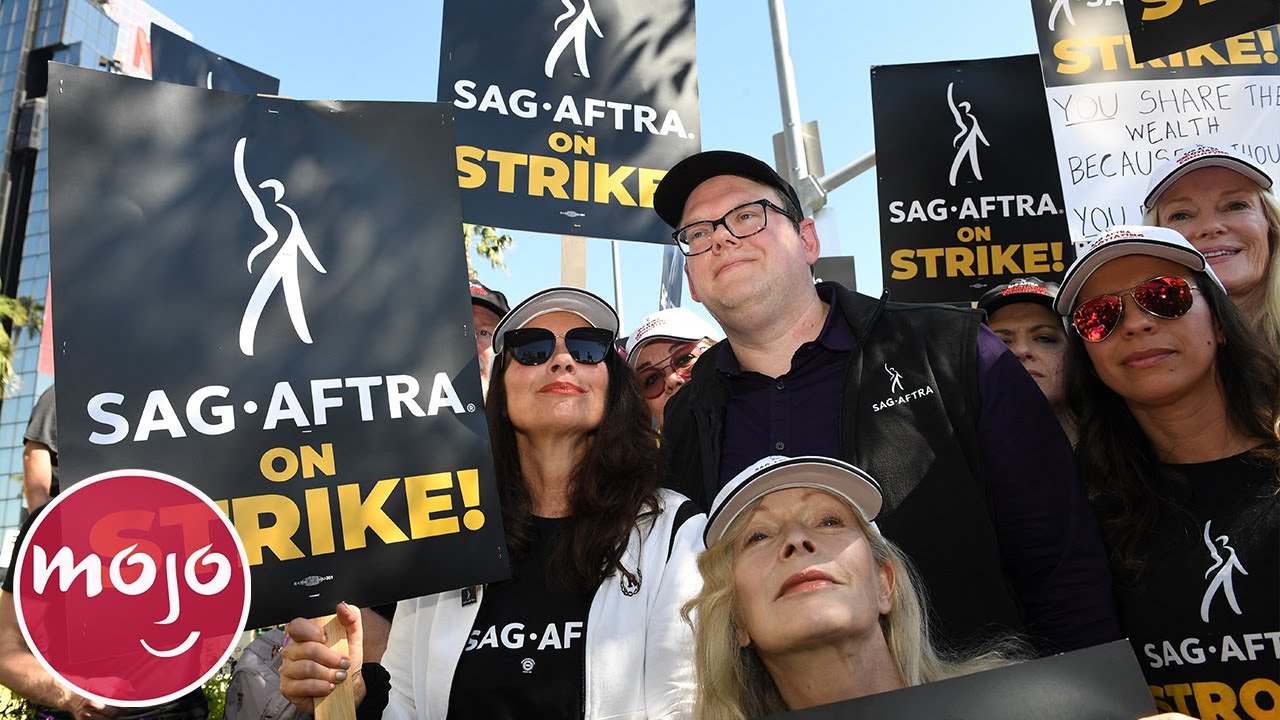The ongoing actor’s strike has been causing major disruptions in the entertainment industry, leaving fans wondering how it will affect winter releases. Reports attribute several major film releases underperforming at the box office to lack of visible promotion from actors, and announcements that eagerly anticipated film and television releases will have delayed or yet-unknown release dates are getting fans’ attention.
As the strike reaches its hundredth day, Hollywood’s biggest stars have pledged to commit $1 million each to support the striking actors. However, with negotiations between the actors’ union and the studios still ongoing, it remains unclear how long the strike will last and what the ultimate impact will be on the winter releases.
The strike has already caused a number of shifts in the entertainment industry, with delayed film releases and shakeups to fall TV. Fans are eagerly waiting for updates on the release dates of the highly anticipated winter releases, including blockbuster movies and popular TV shows. The strike is expected to have a significant impact on the entertainment industry, and fans are hoping for a resolution soon.
The Actor’s Strike: An Overview
The ongoing actor’s strike has been a major topic of discussion in the entertainment industry. The strike, which began in July, has been led by the Screen Actors Guild-American Federation of Television and Radio Artists (SAG-AFTRA). The union represents approximately 160,000 actors, announcers, journalists, dancers, and other media professionals.
The main issue behind the strike is the union’s demand for better compensation and improved working conditions for its members. The union has been negotiating with the Alliance of Motion Picture and Television Producers (AMPTP) for a new contract since May, but talks have failed to produce an agreement.
The strike has already affected several TV shows and movies, and it is expected to have a significant impact on the winter releases. Many productions have been put on hold, and some have been cancelled altogether. This has left many studios scrambling to find alternative projects to fill the void.
Despite the impact of the strike, some studios have managed to continue production by using non-union actors or by negotiating separate contracts with the striking actors. However, this has not been a viable option for all productions, and many have been forced to delay their release dates.
Overall, the actor’s strike has created a significant disruption in the entertainment industry. It remains to be seen how long the strike will last and what the final outcome will be.
Impact on Winter Releases
The ongoing actors’ strike has already caused significant disruptions in the entertainment industry, and winter releases are no exception. Here are some of the ways the strike is likely to impact upcoming releases.
Delays in Production
One of the most significant effects of the actors’ strike is the delays in production. With many actors refusing to work until their demands are met, many productions have ground to a halt. This means that winter releases that were in production may not be completed in time for their scheduled release dates.
Changes in Release Schedules
The delays in production caused by the strike are also leading to changes in release schedules. Some studios have already announced that they are pushing back the release dates of their winter releases. For example, the release of the highly anticipated action movie “Winter Warriors” has been delayed by three months due to the strike. Other studios may follow suit, as it becomes clear that their winter releases will not be ready in time for their original release dates.
In addition to delays and changes in release schedules, the actors’ strike is also likely to impact the quality of some winter releases. With some productions rushed or incomplete due to the strike, some movies and TV shows may not be up to the standards audiences expect. However, it remains to be seen exactly how significant this impact will be.
Overall, the actors’ strike is likely to have a significant impact on winter releases. Delays in production and changes in release schedules are already being felt, and there may be further disruptions in the coming weeks and months. Fans of winter releases will need to stay tuned for further updates as the situation develops.
Financial Implications
The ongoing actor’s strike will have significant financial implications for the entertainment industry. Here are some of the ways the strike will affect the industry financially:
Revenue Losses
Movie theaters will be hit hard by the strike, as they rely heavily on new releases to attract audiences. With no new releases, theaters will see a significant drop in revenue, which could lead to closures. According to Moody’s Investors Service, movie theaters are the businesses most at risk from the strike.
Streaming services and TV networks will also see a decline in revenue, as they will have to rely on reruns and older content. This could lead to a decrease in subscriptions and ad revenue.
Increased Budgets
The strike is also expected to increase the budgets of future productions. With fewer experienced actors and writers available, studios will have to pay higher salaries to attract talent. This could lead to higher production costs and ultimately higher ticket prices for consumers.
Additionally, studios may have to spend more money on marketing to promote their films and TV shows, as they won’t be able to rely on the star power of actors to draw audiences.
Overall, the financial implications of the ongoing actor’s strike will be felt by consumers and the entertainment industry for years to come.
Effects on Actors and Crew
Unemployment Issues
The ongoing actor’s strike is causing major disruptions in the entertainment industry, and the effects are being felt by both actors and crew members. As productions are halted, many people are facing unemployment and financial uncertainty. According to a report, several major film releases have underperformed at the box office due to a lack of promotion from actors, and eagerly anticipated film and television releases are facing delayed or unknown release dates.
As the strike continues, actors and crew members are facing the possibility of losing their jobs and struggling to make ends meet. While some may be able to find work on non-union productions or in other industries, many are left with few options and uncertain futures.
Wage Disputes
One of the main issues at the heart of the actor’s strike is wage disputes. Actors are demanding fair compensation for their work, including better pay and benefits. However, studios and production companies are hesitant to meet these demands, citing budget constraints and the need to remain competitive in the industry.
The wage disputes are not only affecting actors but also crew members, who are often paid significantly less than their counterparts in other industries. Many crew members are also demanding fair compensation for their work and better working conditions.
Overall, the ongoing actor’s strike is having a significant impact on both actors and crew members in the entertainment industry. As negotiations continue, it remains to be seen how the strike will be resolved and what the long-term effects will be.
Viewer Response and Expectations
Audience Reactions
As the ongoing actor’s strike continues to affect the entertainment industry, audiences are beginning to voice their concerns and expectations for winter releases. Many fans are disappointed by the delay in their favorite TV shows and movies, while others are concerned about the quality of productions that may be rushed to meet release dates.
Some viewers have taken to social media to express their frustration with the lack of new content, while others are voicing support for the striking actors and their demands. Many are also curious about how the strike will affect the storylines and character development of their favorite shows and movies.
Despite the uncertainty and disappointment, some fans are hopeful that the strike will ultimately lead to positive changes in the industry, such as fairer wages and better working conditions for actors and other industry professionals.
Overall, the audience response to the ongoing strike is mixed, with some expressing frustration and disappointment, while others are hopeful for positive change in the industry.
Possible Solutions and Negotiations
Union Negotiations
The ongoing Actors Strike has caused major disruptions in the entertainment industry, leading to delays in the release of several movies and TV shows. The Screen Actors Guild-American Federation of Television and Radio Artists (SAG-AFTRA) union and the Alliance of Motion Picture and Television Producers (AMPTP) have been in negotiations for over 100 days, and while they have made progress, no final agreement has been reached yet.
Possible solutions that have been proposed by SAG-AFTRA include better pay and working conditions for actors, increased safety measures on set, and better healthcare benefits. The AMPTP has countered with proposals for reduced pay and shorter work hours, arguing that these measures are necessary to keep production costs down.
Despite the ongoing negotiations, it is unclear when the strike will end and when winter releases will be back on track. Both sides are hopeful that a deal can be reached soon, but until then, fans will have to wait for their favorite shows and movies.
Alternative Production Methods
While negotiations continue, some studios have turned to alternative production methods to keep their projects on track. For example, some studios have turned to animation and voice acting to continue production on their shows and movies. Other studios have turned to non-union actors or have moved production to other countries where labor costs are lower.
However, these alternative methods have their own challenges and limitations. For example, animation and voice acting may not be suitable for all projects, and working with non-union actors can lead to legal and ethical issues. Additionally, moving production to other countries can lead to language and cultural barriers, as well as logistical challenges.
Overall, while alternative production methods may provide temporary solutions, they are not sustainable in the long term. It is important for both sides to come to an agreement that benefits everyone involved in the industry.
Long-Term Industry Changes
Potential Shifts in Filmmaking
The ongoing actors’ strike has caused significant disruptions in the film industry, and these disruptions are likely to have long-term effects on the way films are made. One of the most significant potential shifts in filmmaking is the increased use of non-union actors. As studios struggle to find talent willing to cross the picket lines, they may turn to non-union actors to fill roles. This could lead to a permanent change in the makeup of Hollywood’s workforce, with more non-union actors working on major productions.
Another potential shift is the increased use of digital effects and animation. With fewer actors available to work on set, studios may turn to digital effects and animation to fill the gaps. This could lead to a significant increase in the use of these technologies in mainstream filmmaking.
Future of Actor’s Unions
The ongoing actors’ strike has also raised questions about the future of actor’s unions. As actors struggle to secure better wages and working conditions, some have criticized the existing union structure for not doing enough to support its members. This could lead to a significant shake-up in the way actor’s unions operate, with more emphasis on direct action and grassroots organizing.
There is also the possibility that the ongoing strike could lead to the formation of new unions or the expansion of existing ones. As actors become more frustrated with the existing union structure, they may seek out new ways to organize and advocate for their rights.
Overall, the ongoing actors’ strike is likely to have significant long-term effects on the film industry. While the immediate impact may be felt in delayed releases and empty sets, the changes that result from this strike could shape the industry for years to come.



 RELATED POSTS
RELATED POSTS





0 Comments